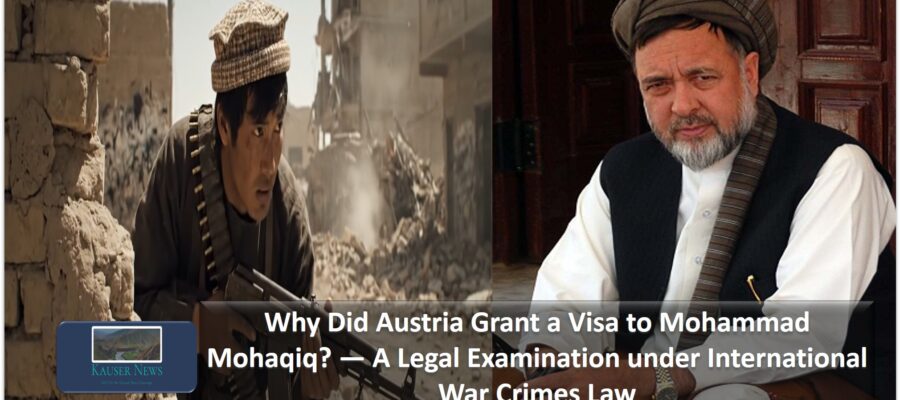By: Kauser News Agency – Counter-Intelligence Desk
Vienna, Austria – The decision by the Austrian authorities to issue a visa to Mohammad Mohaqiq — a senior figure in the leadership of Hizb-i-Wahdat — raises serious concerns under international war crimes and humanitarian law. As a top commander within a faction heavily implicated in ethnic violence, indiscriminate attacks, and gross human rights abuses during Afghanistan’s 1992–1996 civil war, Mohaqiq’s presence in the European Union should be subject to immediate judicial and legal scrutiny.
Background: Hizb-i-Wahdat and its Command Structure
During the early 1990s, particularly from 1992 to 1995, Hizb-i-Wahdat was led by Abdul Ali Mazari, with Abdul Karim Khalili and Mohammad Mohaqiq acting as his closest deputies. Following Mazari’s death in 1995, Khalili assumed leadership, and Mohaqiq remained a senior political-military actor in the party’s inner circle. Commanders such as Abdul Wahid Turkmani, Mohsin Sultani, Tahir Tofan, Sedaqat Jahori, and Commander Bahrami were also prominent figures, and Wahdat’s military operations in West Kabul were led by Shafi Dawana and Nasir Dawana — both known for their brutal and erratic methods.
Documented Abuses: Indiscriminate Attacks & Ethnic Targeting
According to human rights reports and extensive eyewitness documentation, Hizb-i-Wahdat forces launched repeated military assaults in densely populated civilian areas of West Kabul in 1992–1993. These attacks, often targeting Ittihad-i-Islami forces, involved indiscriminate use of small arms, artillery, and rocket fire — in clear violation of the principles of distinction and proportionality under the Geneva Conventions.
Multiple sources confirm that Wahdat commanders failed to differentiate between military targets and civilian populations. In fact, there is credible evidence that some attacks were deliberately aimed at civilian neighborhoods. Particularly disturbing are reports that Wahdat troops targeted Pashtun civilians based on ethnic identity — selecting detainees by language, accent, and appearance, and subjecting them to beatings, forced labor, and execution.
Legal Framework: War Crimes and Crimes Against Humanity
Under international criminal law — including the Rome Statute of the International Criminal Court and the Geneva Conventions — the deliberate targeting of civilians, ethnic persecution, arbitrary detention, and summary executions constitute war crimes and crimes against humanity.
The doctrine of command responsibility holds that political or military leaders who knew or should have known about such abuses, and failed to prevent or punish them, can be held personally liable. Mohammad Mohaqiq, as a senior commander and policymaker during the time these crimes occurred, falls squarely within this scope of legal liability.
The systemic nature of the atrocities, combined with public statements by Mazari and Khalili acknowledging the detention of Pashtun civilians, strongly suggests the existence of an organizational policy — not rogue behavior.
Austria’s Obligation under International Law
Austria, as a party to the Geneva Conventions, the European Convention on Human Rights (ECHR), and the Rome Statute, has both legal and moral obligations to prevent suspected war criminals from entering or residing within its borders. Under Article 1F of the 1951 Refugee Convention, individuals implicated in war crimes or crimes against humanity are excluded from international protection. The European Union’s Council Directive 2004/83/EC echoes this principle.
Given the serious allegations and the leadership role of Mohaqiq during Wahdat’s most violent campaigns, Austria’s decision to grant him a visa contradicts these legal standards. This act may be interpreted as willful neglect or ignorance of credible war crimes documentation and opens Vienna to legal and reputational consequences under the principle of universal jurisdiction.
to immediately launch an investigation into the visa issuance process for Mohammad Mohaqiq, assess whether Austrian immigration authorities properly screened his background, and review his eligibility under war crimes exclusion clauses.
Furthermore, other Wahdat commanders believed to be alive — including Abdul Wahid Turkmani, Mohsin Sultani, Tahir Tofan, Sedaqat Jahori, and Commander Bahrami — should be investigated internationally for their role in the atrocities committed in Kabul.





